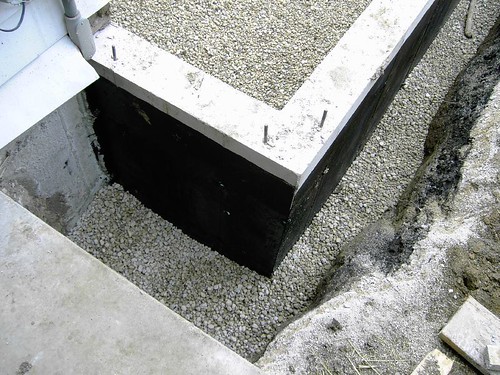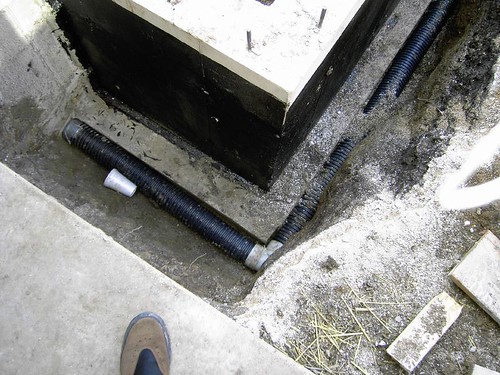Drain Tile Installation Servicesin Grosse Pointe Farms MI
Drain Tile Installation for Optimal Water Management
We Are Locally Owned & Operated For Over 37 Years
Contact Us Today!
We Serve Businesses In And Around The Following Cities:
About Drain Tile Installation Services
Introduction
In the historically-rich city of Grosse Pointe Farms, preserving the integrity and operation of commercial buildings is of crucial importance. A significant part of this preservation process is ensuring an effective, functional drainage system. Among the best drainage solutions is drain tile installation. Given the unique composition of Grosse Pointe Farm’s soil and weather conditions, utilizing drain tiles can solve a myriad of water problems for commercial properties, thereby protecting their structural integrity and enhancing their durability while offering a host of economic benefits.
Understanding Drain Tile Installation
Drain tile, despite its name, doesn’t necessarily deal with actual tiles but portrays a system of piping installed underground, often around a building’s foundation. This system of piping popularly known as the basement drain tile system is designed to collect and redirect water away from the establishment, preventing water damage and ensuring a structurally sound property. Installing a drain tile can particularly be beneficial around the foundation, mitigating water pooling and soil erosion – two significant threats to the gross structural integrity of commercial buildings.
D&J Contracting, a leading name in the installation of drain tile systems in Grosse Pointe Farms, emphasizes the importance of proper installation, taking into consideration factors like soil type, landscape grading and the existing drainage conditions. Offering customized solutions to match property requirements, their expert team goes beyond simply laying drain tile in the yard. They integrate advanced practices like basement drain tile installation and french drain tile system, proving to be a one-stop solution for a variety of drain tile needs.
Steps Involved in Drain Tile Installation
Despite seeming complex, drain tile installation around a foundation or in the backyard involves several detailed yet straightforward steps. The process starts with excavating the area around the foundation to prepare for the installation of the drain tile pipe. This is followed by laying a layer of gravel in the trench for the pipe to rest upon. The installed pipe is then covered by more gravel to ensure proper water conveyance towards the drain tile, with a landscape fabric topping to prevent soil and debris intrusion.
However, improperly installed drain tile systems can cause more harm than good, leading to severe structural threats to the property. Hence, it is recommended to hire professional drain tile contractors. But how to identify the right contractor? A good contractor will not only concentrate on the installation but will also provide solutions like basement drain tile system and french drain tile system, considering the water flow and other property-specific factors.
Among leading names in Grosse Pointe Farms, D&J Contracting has etched their mark as reliable, professional, and efficient drain tile contractors. Their expansive services include installing drain tile around existing houses, putting in drain tiles for gutters, and bringing in the best weeping tile contractors for ensuring effective water diversion.
Benefits of Drain Tile Installation
Other than preventing water seepage and maintaining the structural soundness of your commercial property, drain tile installation offers tremendous benefits. It enhances the lifespan of the construction material and helps maintain a dry, healthy basement, which can otherwise be a source of molds and mildew. Furthermore, a well-installed drain tile system can enhance the property value, making it a sound investment.
Businesses in Grosse Pointe Farms like Lakeside Shopping Center and The Hill have immensely benefited from hiring quality services like the ones offered by D&J Contracting. Their specialized services in basement drain tile installation, drain tile around the foundation, and french drain tile system have not only helped structures prevent water damage but also saved them from expensive future repairs.
Key Considerations for Drain Tile Installation
It is helpful to consider a few things before opting for a drain tile installation. The type of soil and its permeability, the amount of rainfall in the area, and the type of construction material used in the commercial building all play a role in determining the kind of drain tile system needed.
Businesses in Grosse Pointe Farms have found reliance on providers like D&J Contracting for these services of utmost importance. Their technical expertise and in-depth knowledge of local conditions make sure that the drain tile installation is done right, the first time.
Drain tile installation is undoubtedly a thoughtful investment when it comes to preserving and enhancing the life and value of your commercial property. With an intricate understanding of water movement, equip your property against potential water damages and weather-induced wear and tear. Make the smart choice and secure the foundation of your business today!
Drain Tile Installation Services Gallery


Call Us Today to receive your Free Quote for
Drain Tile Installation in Grosse Pointe Farms
Serving: Grosse Pointe Farms, Michigan

About Grosse Pointe Farms, Michigan
The area that would become Grosse Pointe Farms was originally incorporated as the Village of Grosse Pointe in 1879. By 1889, the village extended from land just above Provencal Road in the northeast to Cadieux Road in the west. In 1893, the portion of the village east of Fisher Road broke off and incorporated as the Village of Grosse Pointe Farms after a dispute over the location of a tavern. It was not until 1949, however, that the village incorporated as a city.
The U.S. Postal Service operates the Grosse Pointe Post office in Grosse Pointe Farms.
According to the United States Census Bureau, the city has a total area of 12.32 square miles (31.91 km), of which 2.75 square miles (7.12 km) is land and 9.57 square miles (24.79 km) is water. The water is part of Lake St. Clair.
The Farms has a more varied topography and streetscape than the other southern Grosse Pointes. While Grosse Pointe and Grosse Pointe Park are built on a standard street grid and are basically flat, Grosse Pointe Farms is partially built on the same grid flowing out of Detroit, but also features districts with irregular, curving street paths. A low but noticeable ridge runs through the center of the city. The Farms also contains the “point” in Grosse Pointe, where, just east of the Grosse Pointe War Memorial, there is a large bend in the lakeshore, such that those on the shoreline face east, instead of south, as they do when on the shoreline of neighboring Grosse Pointe, closer to the entrance of the Detroit River.
The cityscape varies widely, with large sections of old homes ranging from bungalows to mansions, and a few newer sections with ranch houses or luxury homes built on subdivided estates. The Farms has a downtown on Kercheval Avenue combining historic buildings with newer, neo-traditional storefronts.
| Census | Pop. | Note | %± |
|---|---|---|---|
| 1900 | 817 | — | |
| 1910 | 862 | 5.5% | |
| 1920 | 1,649 | 91.3% | |
| 1930 | 3,533 | 114.3% | |
| 1940 | 7,217 | 104.3% | |
| 1950 | 9,410 | 30.4% | |
| 1960 | 12,172 | 29.4% | |
| 1970 | 11,701 | −3.9% | |
| 1980 | 10,551 | −9.8% | |
| 1990 | 10,092 | −4.4% | |
| 2000 | 9,764 | −3.3% | |
| 2010 | 9,479 | −2.9% | |
| 2020 | 10,148 | 7.1% | |
| U.S. Decennial Census | |||
As of the census of 2010, there were 9,479 people, 3,718 households, and 2,770 families residing in the city. The population density was 3,446.9 inhabitants per square mile (1,330.9/km). There were 3,952 housing units at an average density of 1,437.1 per square mile (554.9/km). The racial makeup of the city was 95.4% White, 1.8% African American, 0.2% Native American, 1.3% Asian, 0.4% from other races, and 1.0% from two or more races. Hispanic or Latino of any race were 2.0% of the population.
There were 3,718 households, of which 33.7% had children under the age of 18 living with them, 66.0% were married couples living together, 6.2% had a female householder with no husband present, 2.3% had a male householder with no wife present, and 25.5% were non-families. 23.0% of all households were made up of individuals, and 12.3% had someone living alone who was 65 years of age or older. The average household size was 2.55 and the average family size was 3.02.
The median age in the city was 45.1 years. 25.8% of residents were under the age of 18; 4.8% were between the ages of 18 and 24; 19.5% were from 25 to 44; 32.6% were from 45 to 64; and 17.5% were 65 years of age or older. The gender makeup of the city was 48.8% male and 51.2% female.
At the 2000 census, there were 9,764 people, 3,804 households, and 2,868 families residing in the city. The population density was 3,618.8 inhabitants per square mile (1,397.2/km). There were 3,937 housing units at an average density of 1,459.2 per square mile (563.4/km). The racial makeup of the city was 97.58% White, 0.65% African American, 0.11% Native American, 1.13% Asian, 0.11% from other races, and 0.42% from two or more races. Hispanic or Latino of any race were 1.11% of the population.
There were 3,804 households, of which 34.3% had children under the age of 18 living with them, 67.8% were married couples living together, 6.1% had a female householder with no husband present, and 24.6% were non-families. 22.3% of all households were made up of individuals, and 12.0% had someone living alone who was 65 years of age or older. The average household size was 2.57 and the average family size was 3.03.
Age distribution was 26.5% under the age of 18, 3.6% from 18 to 24, 23.4% from 25 to 44, 28.6% from 45 to 64, and 17.9% who were 65 years of age or older. The median age was 43 years. For every 100 females, there were 90.6 males. For every 100 females age 18 and over, there were 87.5 males.
The median household income was $100,153, and the median family income was $109,264. Males had a median income of $87,108 versus $53,241 for females. The per capita income for the city was $54,846. About 1.5% of families and 2.1% of the population were below the poverty line, including 3.1% of those under age 18 and 1.4% of those age 65 or over.
The community is served by Grosse Pointe Public Schools (GPPSS). Public schools within Grosse Pointe Farms include Père Gabriel Richard Elementary School, Kerby Elementary School, Brownell Middle School, and Grosse Pointe South High School. Along with Richard and Kerby, Monteith Elementary School in Grosse Pointe Woods serves a section of the city. All residents are zoned to Brownell. Almost all residents are zoned to GPS High, while those in a northwest section are zoned to Grosse Pointe North High School in Grosse Pointe Woods.
Saint Paul Catholic School is in Grosse Pointe Farms.
The Grosse Pointe Public Library operates the Central Branch in Grosse Pointe Farms.
Call Us Today to receive your Free Quote for
Drain Tile Installation in Grosse Pointe Farms
Related Services in Grosse Pointe Farms, Michigan
We Serve Businesses In The Following Zip Codes:
48007, 48015, 48021, 48026, 48035, 48036, 48038, 48042, 48043, 48044, 48045, 48046, 48047, 48048, 48050, 48051, 48066, 48071, 48080, 48081, 48082, 48083, 48084, 48085, 48088, 48089, 48090, 48091, 48092, 48093, 48098, 48099, 48225, 48230, 48236, 48310, 48311, 48312, 48313, 48314, 48315, 48316, 48317, 48318, 48397